Popular oat milk brand Oatly has been around since the mid-90s, making it one of the oldest players in the plant milk space.
The company has enjoyed phenomenal success, but the last couple of years of its history have been mired in controversy...and their story will call into question everything you thought you knew about health foods.
The Case Against Oatly
Oatly markets itself as both nutritious and good for the environment.
It’s oat milk; it should be healthy and low-carbon, right?
However, recent claims have rung some alarm bells for consumers of Oatly as well as for consumers of innumerable less famous oat milk brands.
The controversy erupted after a 2021 tweet from a consumer who called Oatly “super sugar grain juice cut with canola oil” went viral.
The post went on to list a litany of unsavory claims about Oatly’s questionable nutritional content and health effects.
The author claimed that Oatly is “cut with canola oil”, and she linked to an earlier (less viral) 2020 expose-style article that branded Oatly “the new coke”.
Meanwhile, other past articles had also spoken up with allegations that Oatly isn’t a healthy product. Here are some of the claims being levied against Oatly:
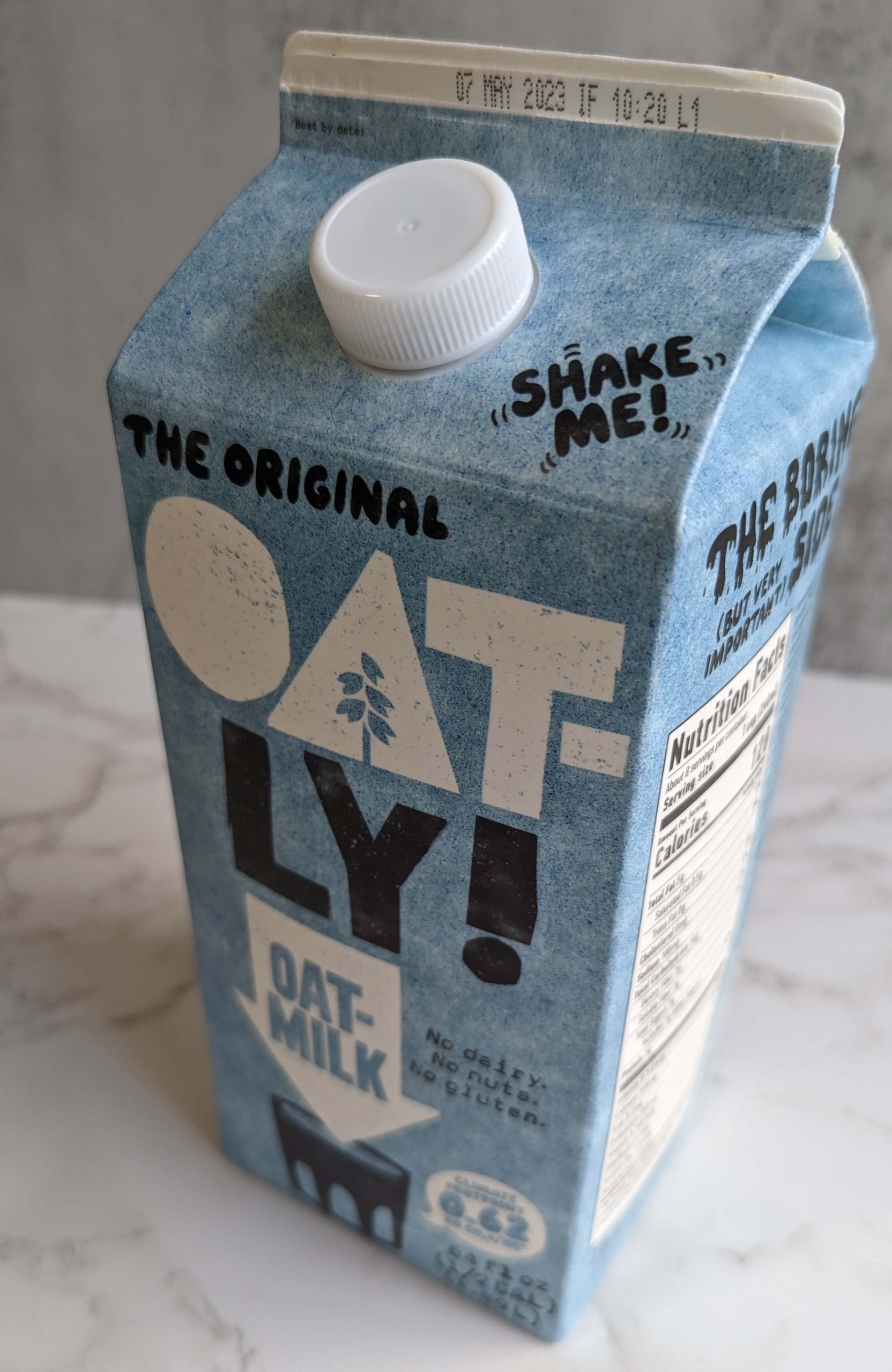
Source: Milk Pick
“Added” Sugars”
The process of breaking down the oats into a smooth and creamy beverage creates a sugar called maltose (7 grams per serving of Oatly).

Source: Milk Pick
Maltose has a glycemic index of 105, which is the highest GI of all edible sugars–almost two times higher than table sugar and even high fructose corn syrup.
That means that 12 ounces of Oatly added to a latte is like adding nearly a whole tablespoon of sugar, and could cause an unhealthy blood sugar spike.
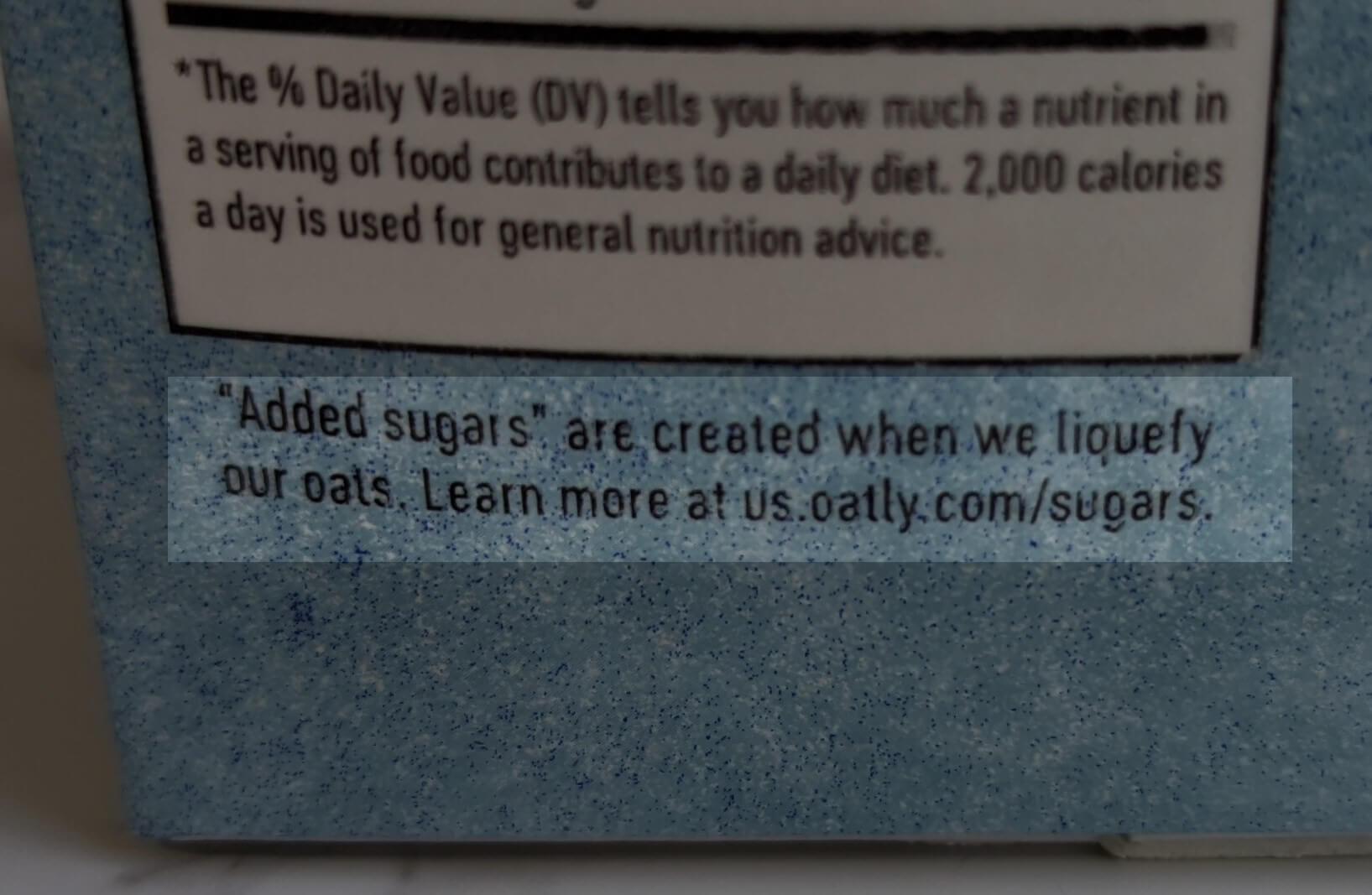
Source: Milk Pick
Inflammatory Oils
After oats, Oatly’s second ingredient is canola oil.
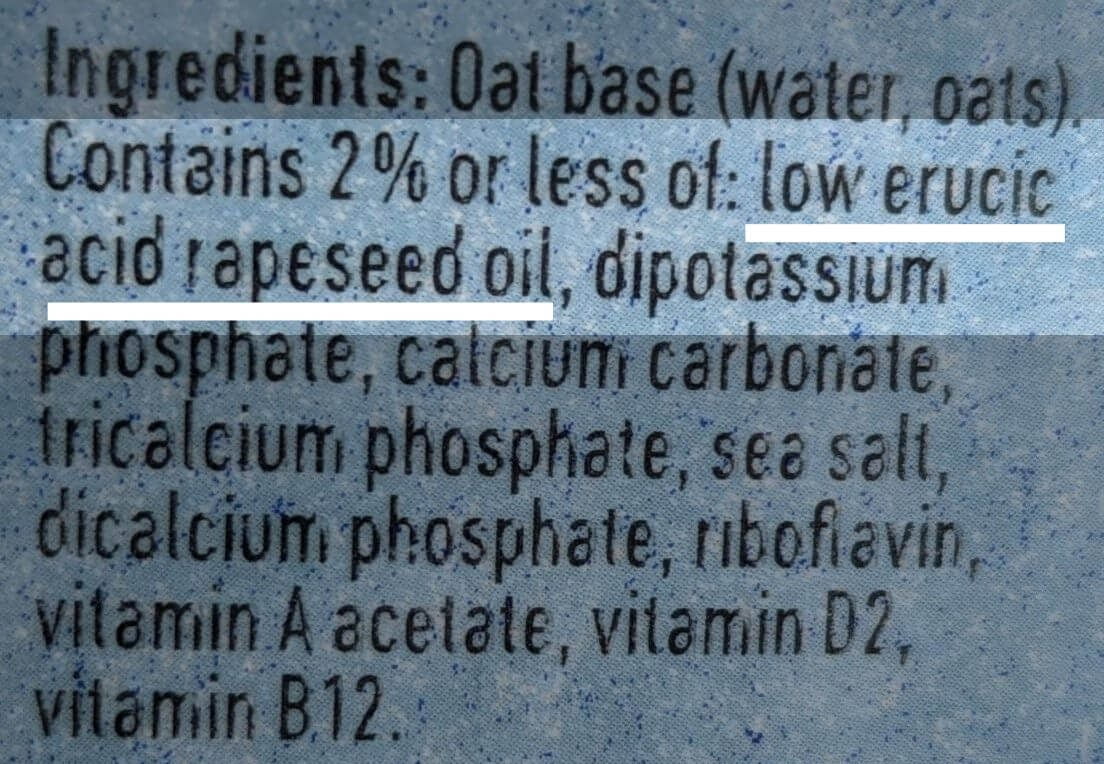
The second listed ingredient in Oatly is rapeseed oil (a.k.a. canola oil)
Some people believe in the health and nutrition spaces contend canola oil is unhealthy and linked to:
- Memory impairment
- Diabetes
- Metabolic syndrome
- Decreased brain function
- Inflammation
Oatly has actually responded to consumers concerned about those 7 grams of maltose.
They contend that their original unflavored oat milk contains only 7 grams of sugar per 8oz serving, which is less than cow’s milk.
That sounds okay, right?
However, critics have pointed out that the sugar in cow’s milk, which has a glycemic index of 46, is more benign than the high-GI maltose in Oatly.
The oat milk giant has also responded to the canola oil debacle, saying that canola has a “great nutritional profile” and that it is low in saturated fats and high in unsaturated fats and omega-3 fatty acids.
They also note canola oil’s low trans fat content and praise themselves for using only “non-GMO, expeller-pressed [canola] oil.”
For what it’s worth, some doctors seem to agree.
In an article published on EatingWell.com, registered dietician Alex Caspero noted that many of the claims against canola oil aren’t fact-based.
“People are confusing animal studies for human trials. Omega-6-rich seed oils have been shown to increase inflammation in rats, not humans.”
Low-Quality Fortification
Oatly fortifies its milk with a range of vitamins, including vitamin D.
While this is a very important nutrient, Oatly has opted to add D2 to their products.
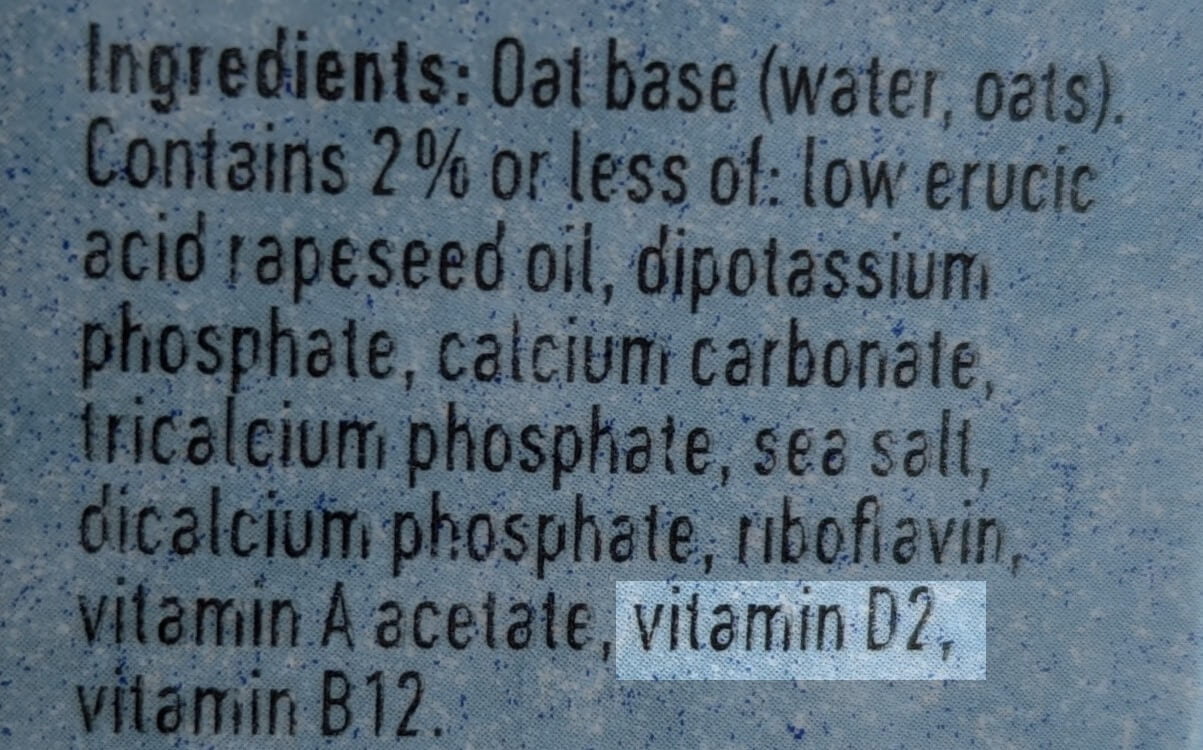
Source: Milk Pick
This version of the vitamin is not easily absorbed and utilized by the body when compared to D3, which is said to be twice as effective at raising vitamin D levels in the bloodstream.
In response to this claim, Oatly pointed out that the Swedish Food Agency’s position is that D2 and D3 are equally effective.
They also reiterated that they intentionally selected vitamin D2 because it is vegan-friendly, whereas vitamin D3 is usually sourced from animal products.
In addition to the doubts that have surfaced around Oatly’s nutritional content, the company has also employed some rather cunning marketing tactics regarding the nutritional and environmental advantages of its products.
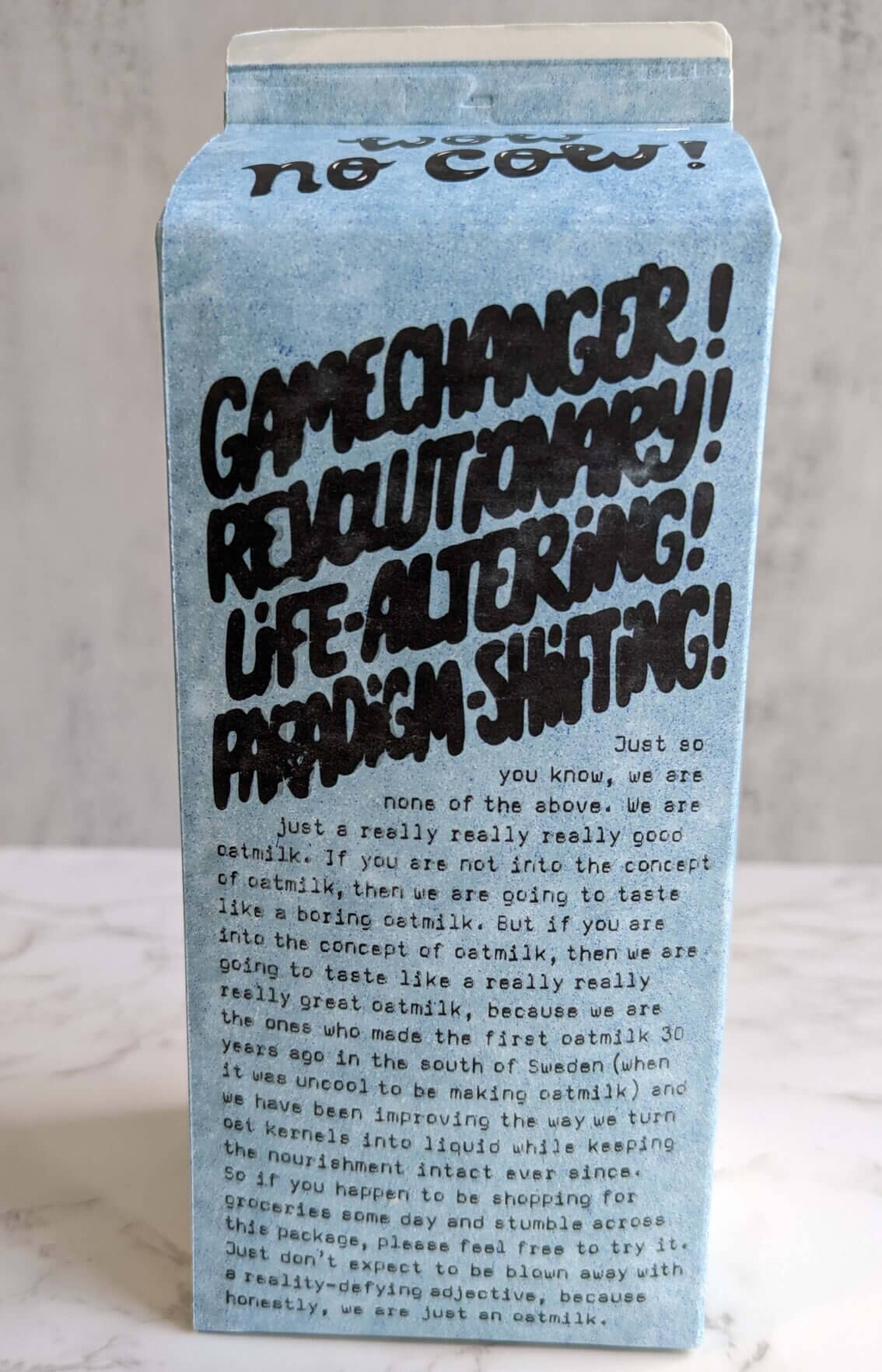
Source: Milk Pick
Climate Marketing Campaign
As mentioned in a Thred article, “Climate experts say cutting dairy and meat products from our diets is the single biggest lifestyle change we can make to reduce our environmental impact.”
This was the premise of Oatly’s more far-reaching marketing claims. And while it’s mostly true, another claim Oatly went on to make as a part of this campaign was…arguably less true.
One of Oatly’s TV advertisements stated that they “generate 73% less CO2 [than] milk, calculated from grower to grocer”.
That certainly sounds pretty climate-friendly.
However, it’s also not based on any peer-reviewed studies and also is not even applicable to every Oatly product.
This well-marketed statistic is applicable only to Oatly’s barista edition oat milk, specifically when compared to full fat cow’s milk…but other Oatly products have not been evaluated for comparison.
Non-full fat varieties of cow milk have also not been included in the comparison.
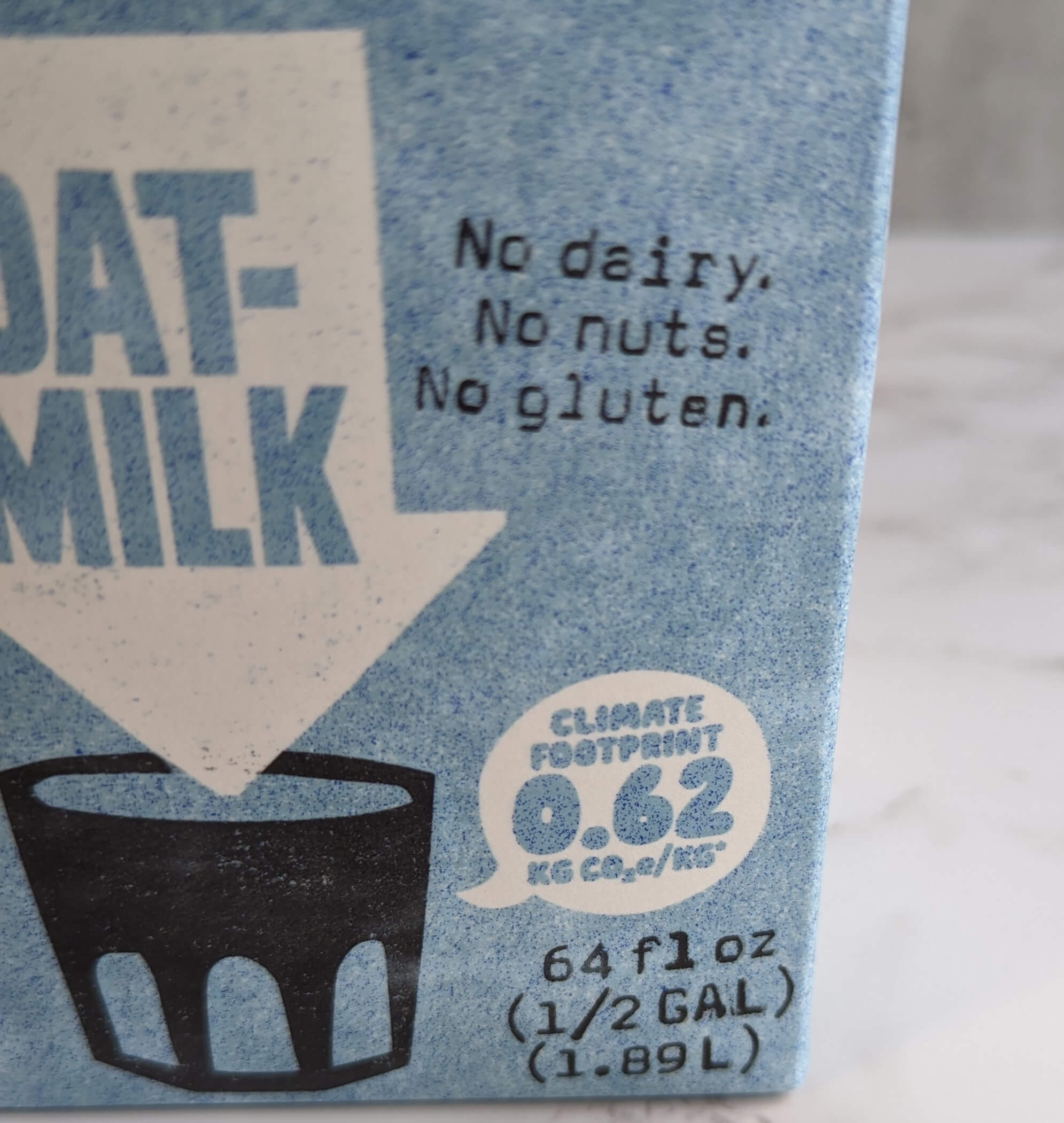
Source: Milk Pick
Health Marketing Campaign
Oatly prides itself on its fiber content.
We need healthy prebiotic fiber to feed the beneficial bacteria in our gut so that they can flourish and, as a result, keep our digestive systems functioning in tip-top shape and even promote mental health. Oatly once called its fiber “the most amazing fiber in the drinkable world”, and "strong and handsome".
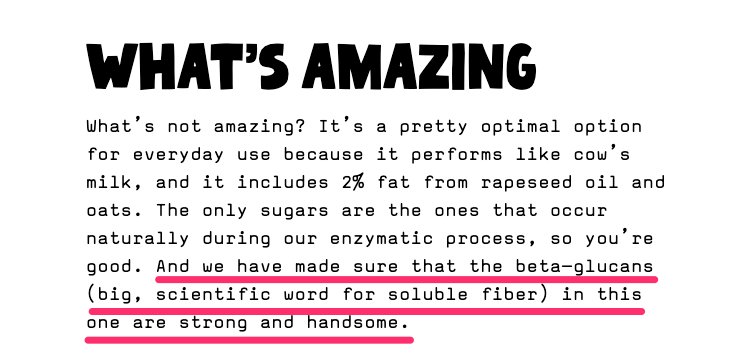
Source: Oatly
However, one serving of Oatly clocks in at two grams of fiber.

Source: Milk Pick
That’s 8% of daily recommended fiber intake for women, and 5% for men–hardly anything to write home about.
Similarly, Oatly markets itself as non-GMO.
While some consumers may truly take comfort in this, it’s also worth noting that the World Health Organization (WHO) as well as the Food and Drug Administration have repeatedly affirmed the safety of the GMO foods and beverages available on the market.
According to the WHO website:
“All genetically modified foods currently available on the international market have passed safety assessments and no effects on human health have been shown as a result of consuming GM foods.”
Marketing aside, Oatly has also been accused of being linked to rainforest deforestation and ties to the Trump administration.
Is Oatly Linked to Amazon Rainforest Deforestation?
In 2020, Oatly sold shares in the company to private equity firm Blackstone.
Soon afterward, Blackstone was allegedly linked to Amazon rainforest deforestation.
The story goes that Blackstone invested in Brazilian infrastructure company Hidrovias; this part is definitely true, but the rest is muddier.
Hidrovias had been accused of being involved in the building of a road through the Amazon, which was “used to transport soy grown on illegally deforested land,” according to an article published in The Guardian.
Blackstone hit back, insisting that the allegations were false and that Hidrovias was not involved in this road.
Their statement on the topic stated that Hidrovias neither owned, controlled, nor had any direct or indirect interest in the road, which had been operated by the Brazilian government since the mid-70s.
It also reiterated that Hidrovias neither built nor paved the road.
Oatly, for their part, insists that they put sustainability at the center of everything they do, including who they choose as owners.
Related: 11 Best Oatly Alternatives!
Political Ties
Blackstone is headed by Stephen Schwartzman, a prominent donor to and supporter of Donald Trump.
Bloomberg reported that Schwartzman donated $3 million to America First Nation, a super pac that supported Trump’s candidacy in the 2020 election.
Unsurprisingly, liberal-leaning Oatly consumers are less than thrilled about Oatly’s involvement with Blackstone.
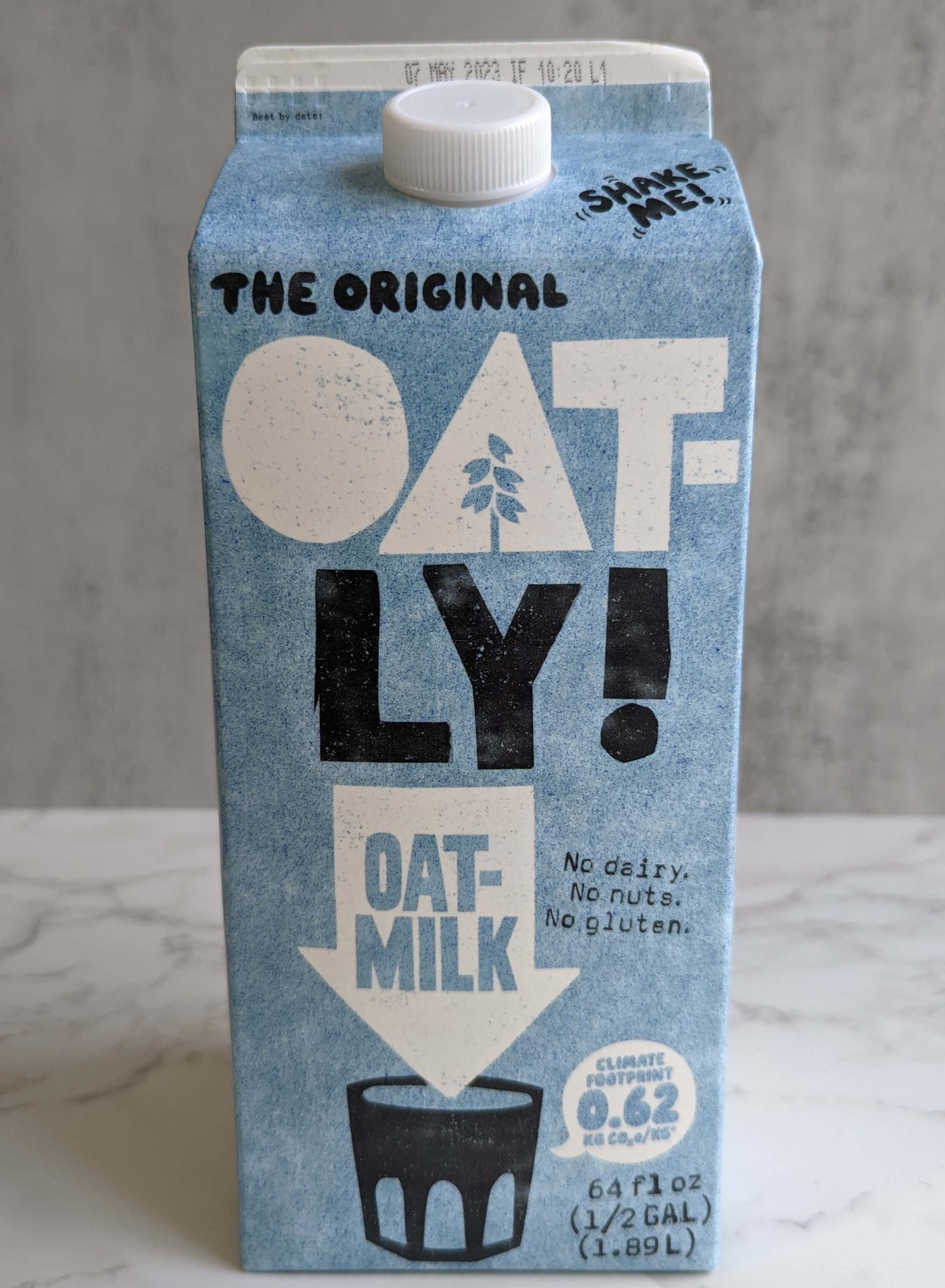
Source: Milk Pick
The Case for Oatly
While Oatly is far from perfect, some of the nutritional claims made by Oatly’s critics are a little misleading.
The Sugar Claims May be Exaggerated
For starters, one of the most viral claims was that adding 12oz of Oatly to a cup of coffee was the equivalent of adding a tablespoon of sugar.
However, a cup of coffee is only 8oz, and 12oz of Oatly would be an extra cup and a half.
Most consumers don’t chug a cup and a half of Oatly at a time, or more than double the size of their tea or coffee by diluting it with a huge glass of Oatly.
If they’re adding it to another beverage, they’re likely using a much smaller amount, which has much less of an effect on blood sugar.
It Probably Won't Spike Your Blood Sugar
Similarly, foods that contain protein, fat, or fiber slow the absorption of Maltose, the sugary end product that results from the process Oatly employs in breaking down its oats.
If you’re putting an ounce or two of Oatly in the coffee you drink with your breakfast, your blood sugar isn’ guaranteed to spike.
The effects of sugars in food and beverages on human blood sugar levels is in large part dependent on what else we do or do not consume in the same meal.
Oatly’s Nutritional Profile Isn’t Comparable to Coke
The article made viral by a tweet in 2021 branded Oatly “the new coke”.
Oatly responded rather compellingly to this unfavorable nickname, pointing out that although an 8oz serving of Oatly appears at first glance to be calorically similar to 12oz of coke, almost all of the calories in a bottle of Coke come from sugar.
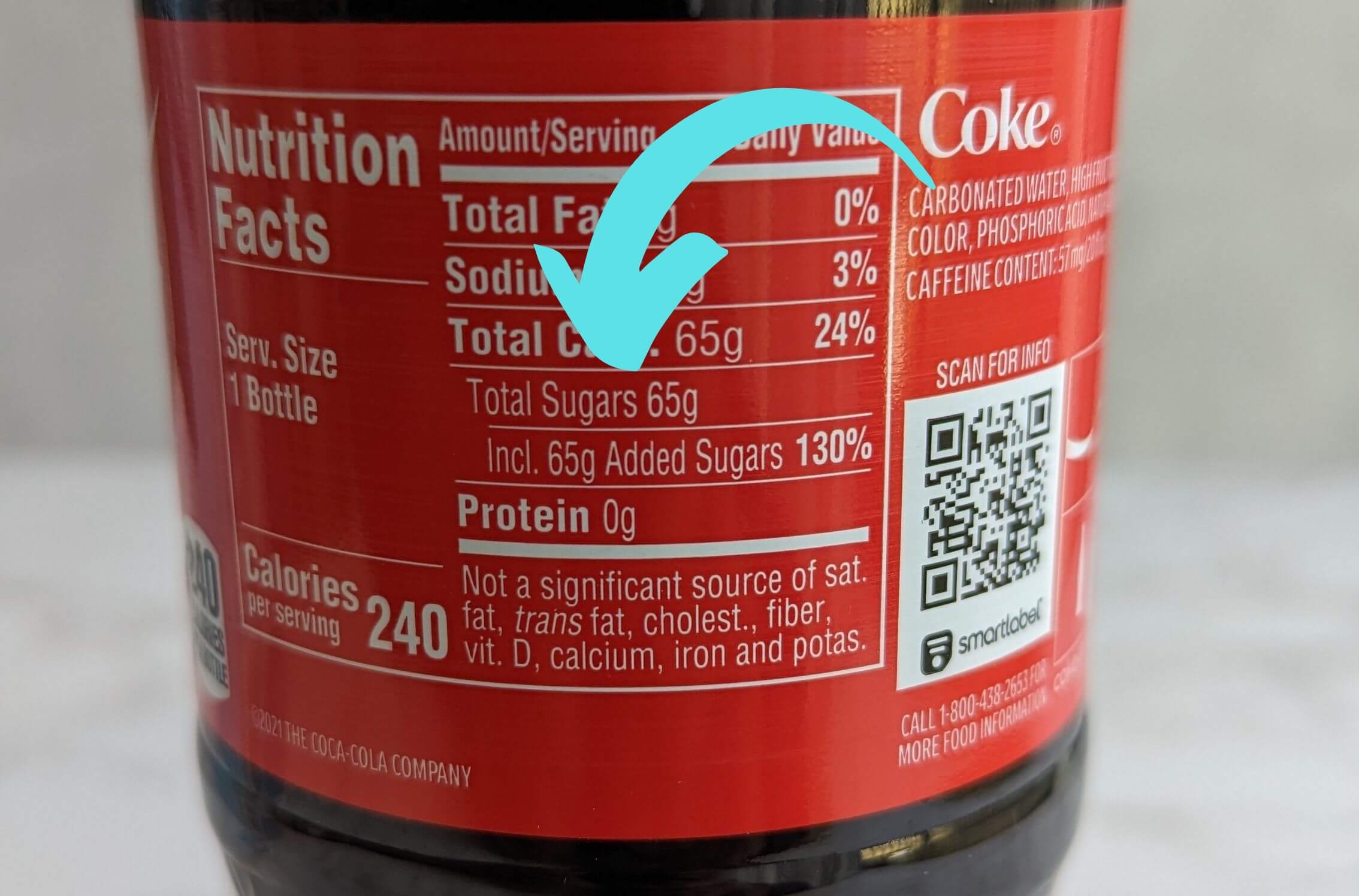
Source: Milk Pick
The calories in Oatly, on the other hand, come from fat, carbohydrates (including sugar), and protein. Those components also lower the glycemic index of a glass of Oatly itself, despite its Maltose content.
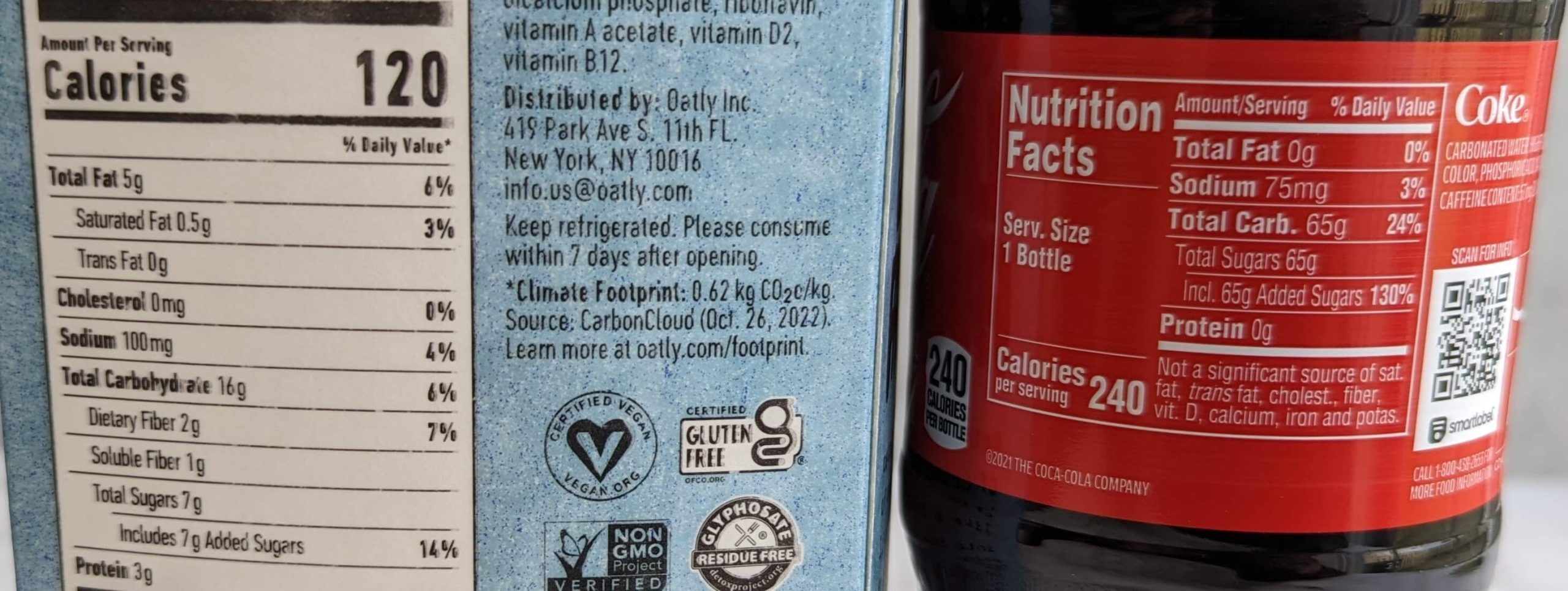
Source: Milk Pick
Even if someone were to drink an entire glass of Oatly on an empty stomach, the resulting blood sugar spike would still be far less than when drinking a bottle of Coke. Oatly is simply not the nutritional equivalent of Coke.
Should You Stop Buying Oatly?
So, is Oatly bad for you?
It’s not great, but it’s not awful, either.
It’s a lot more benign, and less newsworthy than the headlines would have you thinking.
The allegations concerning ties to Amazon deforestation appear shaky at best.
The ties to Schwartzman appear true, but Oatly insists that sustainability is at the core of their vision despite the picture that their ties to the far right might paint.
In other words, the reality is nuanced.
Oatly is neither all good for your health nor all bad for your health. Nor are they completely morally upstanding or morally reprehensible.
If what you read here scared you, check out some of our favorite Oatly alternatives.
Another key takeaway from the story of Oatly is a lot less about nutrition and more about the clever marketing and information-sharing methods employed in covering both sides of this story.
Questionable marketing tactics are common in every industry, especially in the nutritional and wellness spaces.
In addition, a plethora of out-of-context and incomplete information can be found online about every health-related topic.
Most people would agree that making decisions based on scientific information is preferable to doing so based on marketing campaigns and authoritative-looking blogs.
Nevertheless, expert voices are a lot quieter and a lot less easy to stumble upon than advertisements or trendy sources of misinformation.
Take the time to look into what’s really good for you, and what’s simply marketed by the pros.
Your body will thank you.
